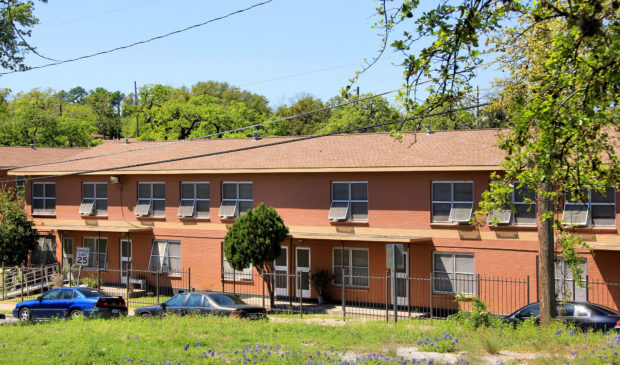Council approves compromise to redevelop and preserve Rosewood Courts
Tuesday, March 27, 2018 by
Jack Craver City Council voted Thursday to permanently preserve eight buildings that are a part of Rosewood Courts, a public housing development in East Austin that was built 80 years ago for African-Americans with funds from the newly created United States Housing Authority.
Under the plan approved unanimously by Council, the exteriors of eight buildings along Chicon Street that are considered by the city’s Historic Preservation Office to be the most historically and architecturally significant will be maintained in their current state.
However, the rest of the property will be redeveloped by the Housing Authority of the City of Austin, which for years has said that Rosewood’s 124 units are in desperate need of upgrades for the sake of its residents.
HACA President Mike Gerber told Council that while his agency has tried its best to maintain the buildings throughout the development, “Rosewood Courts has simply reached the end of its life span,” and redevelopment is the only way to deliver quality housing to current residents.
The eight buildings that will be preserved, said Gerber, are the ones that have the most “visibility and prominence on a major thoroughfare.” HACA also plans to add historic markers to the property to highlight the preserved buildings and educate visitors about their history.
“We have the opportunity to tell the story of Rosewood Courts, whereas today if you were to walk Rosewood Courts, you really wouldn’t otherwise appreciate the significance of this important site,” said Gerber.
Rosewood was one of three public housing developments in Austin championed by then-Congressman Lyndon B. Johnson. Like other New Deal housing initiatives at the time, the Austin housing projects provided much-needed housing for people of all races but also enshrined segregation. Rosewood was designated for African-Americans, while nearby Chalmers Court was reserved for whites and Santa Rita Courts for Mexican-Americans.
Dozens of purple-clad Rosewood residents attended Council on Thursday in support of the renovations. They held signs with slogans such as “Keep Families in East Austin” and “Honor History While Moving Forward.”
Steve Witcher, a resident of Rosewood Courts and vice president of its resident council, described the substandard condition of his own apartment. The lack of insulation, he said, leads to scorching summer temperatures indoors.
“History is a lot more than brick and mortar,” he said. “We also want to make history for the people currently living there and the families that will be living there 100 years from now.”
The zoning case comes to an end after more than two years of competing (and reversed) recommendations from city commissions and negotiations between HACA staff and preservation advocates. The plan that Council approved represented a compromise that was ultimately embraced by both the Planning Commission and the Historic Landmark Commission.
Fred McGhee, who has led an effort to preserve the entire property, denounced the planned redevelopment as an erasure of black history. He accused HACA of misleading residents about their choices, arguing that improved living conditions and historic preservation were not incompatible.
McGhee also alleged that he had been the victim of a relentless bullying campaign by HACA, including a threat of violence by a HACA official who he would not name.
“I said, ‘You’re too small to mess with me’ – although I didn’t use the word mess,” he recalled. “It begins with an ‘F’ and ends with a ‘K.’”
Council was not swayed by McGhee’s testimony. After a quick vote in favor of the plan, the chamber erupted in applause.
Photo by Larry D. Moore [CC BY-SA 3.0 or GFDL], via Wikimedia Commons.
The Austin Monitor’s work is made possible by donations from the community. Though our reporting covers donors from time to time, we are careful to keep business and editorial efforts separate while maintaining transparency. A complete list of donors is available here, and our code of ethics is explained here.
You're a community leader
And we’re honored you look to us for serious, in-depth news. You know a strong community needs local and dedicated watchdog reporting. We’re here for you and that won’t change. Now will you take the powerful next step and support our nonprofit news organization?








